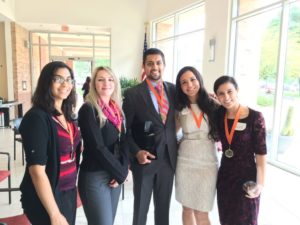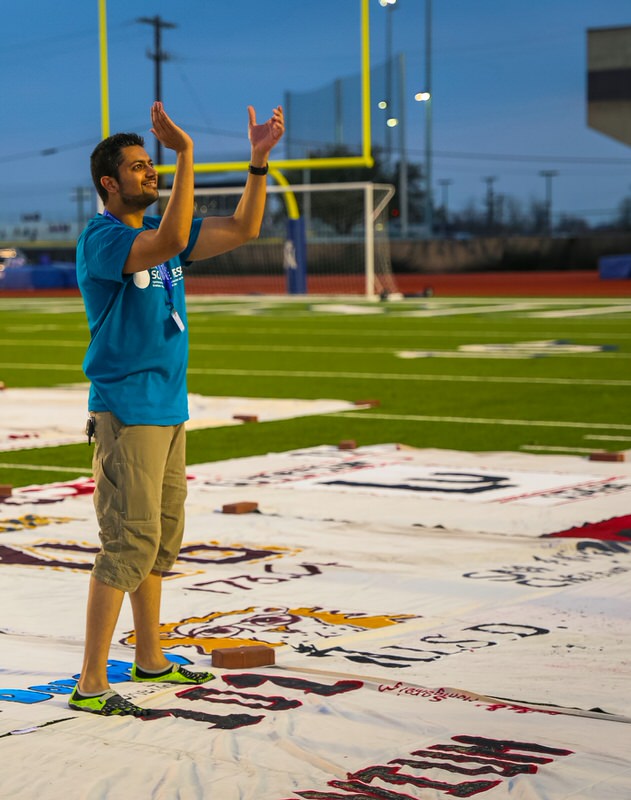Building The Next San Antonio Biotech Company
 Throughout his childhood and into his 20’s, Ahsan Choudary wanted to be a physician. Upon completion of his undergraduate degree in 1999, he prepared for application to medical school while doing research at The University of Texas Health Science Center at San Antonio and starting a Master of Public Health degree at the UT School of Public Health.
Throughout his childhood and into his 20’s, Ahsan Choudary wanted to be a physician. Upon completion of his undergraduate degree in 1999, he prepared for application to medical school while doing research at The University of Texas Health Science Center at San Antonio and starting a Master of Public Health degree at the UT School of Public Health.
“Eventually, I developed a great passion for biomedical research from my years of experience in basic science, clinical, and translational research. I realized that as a scientist, I would be an integral piece of a collaborative, multi-disciplinary team focused on helping people and making their lives better,” he said. “I felt so good about being a part of this cohesive team that I started looking for competitive Ph.D. programs across the nation geared at multi-disciplinary research.”
He decided to apply to the Translational Science Ph.D. program. He is currently being mentored by Dr. Laura Cox, the Vice Chair of Genetics Department at the Texas Biomedical Research Institute and Dr. Reto Asmis, a professor in the Department of Clinical Lab Sciences and Department of Radiology at UT Health San Antonio.
Choudary explained that that is interested in translational science for four reasons.
“Translational science covers the entire spectrum of biomedical research…1) it accelerates bench top discoveries to bedside care 2) bedside care to clinical practice through assessment of treatment efficacy, 3) clinical practice to health care delivery through recommendation of best practice medical guidelines and cost-effectiveness studies, and 4) health care delivery to development of community, public health, and public policy.
At the Texas Biomedical Research Institute, Choudary researches the development of new biomarkers to help detect cardiovascular disease earlier.
“My project specifically investigates the use of breath to diagnose heart disease in babies very early in life. I have always been very passionate about chronic disease research, particularly diabetes and cardiovascular disease, because it continues to be a great health problem in our community,” he said. “My degree and experience in public health convinced me that the best way to approach this problem is through prevention and the development of tools for early diagnosis before it leads to diabetes, metabolic disease, stroke, and heart attack.”
Choudary is passionate about using technology to diagnose and advance health care. He explained that current technology now offers us the necessary analytical tools to identify chemical compounds in breath that potentially relate to different diseases.
“To most people, the use of breath in disease diagnosis sounds either extremely futuristic or quite outlandish,” he said. “The original concept itself, however, is actually thousands of years old and dates back to physicians smelling breath to diagnose diabetes, liver failure, and kidney failure.”
Currently, there are several FDA-approved breath tests for diseases including H. pylori-induced ulcers, asthma, transplant rejection, and neonatal jaundice.
“The next big step is to build a breath test to help inform patients of their risk of chronic diseases such as cancer and cardiovascular disease,” he said. “Perhaps soon, patients will even be able to monitor their blood sugar or urea levels by simply blowing into a small breath analyzer.”
In addition to working on research, Choudary is passionate about science outreach. He explained that his best memories have been volunteering with Science Fiesta, organizing a student-led consulting group, called ComCats (Commercialization Catalysts), and served as our 2016 Graduate School Presidential Ambassador.
“I nev er expected that ComCats (Commercialization Catalysts) would so quickly become successful and garner support from the Office of Technology Commercialization, our Graduate Dean’s Office, the Office of Career Development, and our local biotech community,” he said.
er expected that ComCats (Commercialization Catalysts) would so quickly become successful and garner support from the Office of Technology Commercialization, our Graduate Dean’s Office, the Office of Career Development, and our local biotech community,” he said.
Outside of graduate school, Choudary enjoys cooking Pakistani and Persian cuisine. He is also an avid outdoorsman and mountaineer.
“I have climbed in California’s Sierra Nevada and the Northwest’s Cascades,” he said. “I hope to one day climb in the Andes, Karakoram, and Himalayas. I also love football (not soccer, American football) because of fond memories of watching it with my dad throughout childhood.”
After graduation, Choudary plans to start his own biotech company and work to build translational biotech research in San Antonio.
“Our city has the right ingredients to be the next big biotech hub, and I intend to help make that a reality.”
 This article was written by Charlotte Anthony, marketing specialist at the Graduate School of Biomedical Sciences at UT Health San Antonio. This article is part of the “Meet The Researcher” series which showcases researchers at the Graduate School of Biomedical Sciences at University of Texas Health Science Center San Antonio.
This article was written by Charlotte Anthony, marketing specialist at the Graduate School of Biomedical Sciences at UT Health San Antonio. This article is part of the “Meet The Researcher” series which showcases researchers at the Graduate School of Biomedical Sciences at University of Texas Health Science Center San Antonio.
